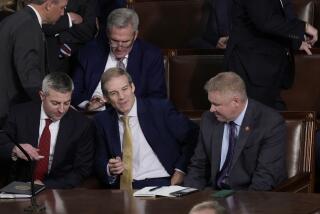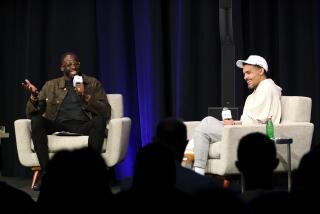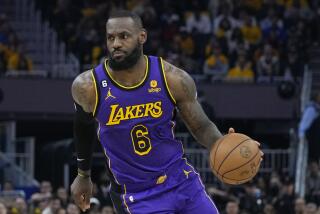Column: Why did Michael Jordan never use his giant megaphone? White America didn’t want to hear it
- Share via
By now, you have probably seen the video of 25-year-old Ahmaud Arbery jogging down a street near his neighborhood in Brunswick, Ga., before being hunted down and confronted by two armed white men. Gunshots can be heard. Arbery’s limp, black body can be seen falling to the ground. And just like that, another hashtag is born.
I have lost track of the number of times I’ve written about this topic. I’ve offered condolences to Sybrina Fulton — Trayvon Martin’s mother — and I’ve been tear-gassed in Ferguson, Mo., covering the uprising after a grand jury decided not to charge the officer who killed Michael Brown. The protest on Staten Island after Eric Garner was choked to death? I was there. The rally following the guilty verdict for the officer that murdered Laquan McDonald in Chicago? I was there too. I’ve seen the pain, felt the anger, heard all of the anguished, outraged cries for senselessly murdered black and brown bodies year after year after year.
“We’re literally hunted EVERYDAY/EVERYTIME we step foot outside the comfort of our homes!” LeBron James tweeted about Arbery’s February killing, for which two men were charged with murder on Thursday. “Can’t even go for a damn jog man!”
Lamar Jackson, the NFL’s 2019 MVP, retweeted the post. Pro Bowler Cameron Jordan asked, “How does this happen?” Budding tennis sensation Coco Gauff posted: “The violence needs to stop. The profiling and racial injustices needs to stop.”
The stream of comments from black athletes regarding Arbery is not unusual. Over the last decade, athletes of color have increasingly used their platforms to draw attention to horrific killings like Arbery’s, express support for a protesting Colin Kaepernick or challenge unnerving rhetoric from politicians.
All that is a significant departure from the apolitical approach Michael Jordan embraced throughout his playing days, something I’ve been thinking about as ESPN is airing “The Last Dance,” its 10-part docuseries about Jordan.
The series provides an incredible, behind-the-scenes look into Jordan’s life and that of his Chicago Bulls teammates. It’s entertaining and compelling; however, given today’s landscape, it also raises unanswered questions. Jordan has been criticized for not using his powerful platform the way Muhammad Ali did before him and James has afterwards, and “Dance” does little in terms of providing cover for that decision.
Now, none of this is to imply that Jordan was some sort of O.J. Simpson level sellout, or that he has an obligation to speak out on matters such as Arbery’s simply because of the color of his skin. It’s also important to note that while Jordan hasn’t made maximum use of his platform, he did say in 2016 that he was “troubled” by the deaths of African Americans at the hands of police and continues to use his resources to fight injustice, including donating $1 million to the NAACP Legal Defense and Educational Fund and $1 million to the International Assn. of Chiefs of Police Institute for Community-Police Relations.
However, Jordan’s public silence on social justice issues during his playing days indirectly reaffirmed a racial power dynamic that defines America every bit as much as the Constitution on which she is founded. Jordan was arguably the most famous man on the planet at the height of his career, but it appeared that not even he was powerful enough to overcome a simple truth: No matter how much favor a black man receives, he should never forget his place.
That is essentially what President Obama meant in his appearance in the docuseries when he said “America is very quick to embrace a Michael Jordan or an Oprah Winfrey or a Barack Obama, so long as it’s understood you don’t get too controversial around broader issues of social justice.”
Jordan could win the adoration of white America (and make them want to buy his sneakers), but only as long as he didn’t talk about what it meant to be black in America.
If Jordan’s documentary makes him out to be Superman, then we all know what his kryptonite was. For as gut wrenching as the Arbery video is, we know Jordan would not have gone anywhere near it during his playing days. We know this because Jordan was silent when the Rodney King video dominated our airwaves.
In the docuseries, he tries to explain his silence on social issues by saying he had tunnel vision about basketball during his career, and that the game was his entire focus. But here’s the rub: he made time to shoot commercials and a music video with Michael Jackson while playing professional basketball. He took time to drape an American flag over the Reebok logo at the 1992 Olympics while playing professional basketball. He made “Space Jam” while playing professional basketball. His public resume leans more toward selective vision than the tunnel variety he’s trying to sell us on.
Again, Jordan is not obligated to use his platform to do anything other than benefit himself. But he doesn’t get to pretend he was too focused on basketball to do anything else, because we’ve seen otherwise. He has said he’s more vocal now because he has more time, but I would argue it’s because times have changed.
The apolitical model he fashioned — and many other athletes of his era imitated — has been overshadowed by a more vocal one. That has come with controversy of course, because when black men and women step out of line, America slaps their wrists. Jordan the player was never chastised, because he stayed strictly within bounds.
But at what cost?
@LZGranderson
More to Read
A cure for the common opinion
Get thought-provoking perspectives with our weekly newsletter.
You may occasionally receive promotional content from the Los Angeles Times.











